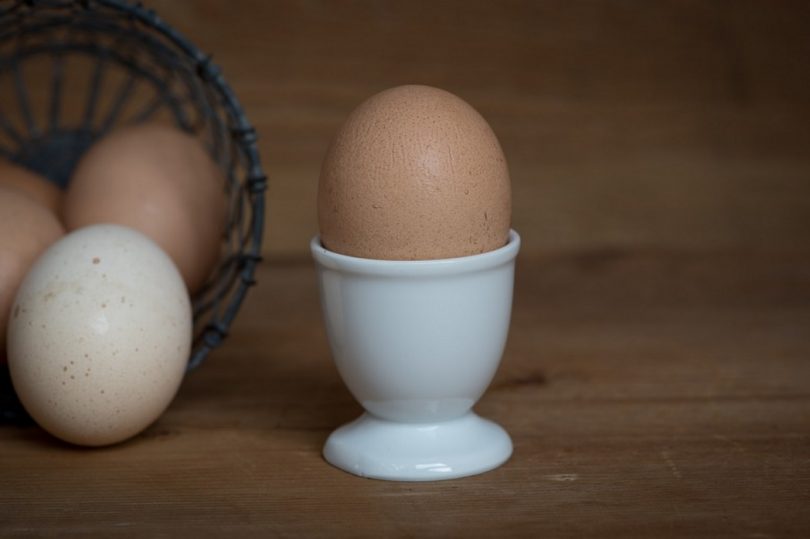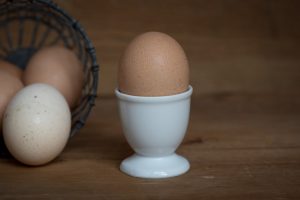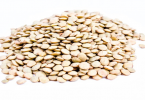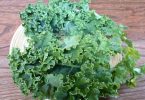Today’s question: can dogs eat eggs? Are eggs good or bad for dogs? Scroll down for detailed answers.
Eggs have taken on a rather potent symbol in human history; from Easter in Christianity to the symbol of Western breakfasts, eggs emerge in all walks of life. And with good reason: they’re a great source of nutrition for us, and they represent the original container of life for many animals, including birds, reptiles, fish, amphibians and mammals. They’re also a bit of a curious case as people still debate whether or not they are meat or not, although the United States Department of Agriculture does classify them as a meat.
Today, the most popular choice of egg is the chicken egg, but other popular eggs for human consumption include quail, duck, roe and, for the elites, caviar. The egg business is a huge and global one. 2009 saw the production of around 62 million tons of chicken eggs globally, all coming from a giant flock of about 6.4 billions hens.
Eggs are essentially fetuses, consisting of a protective outer shell, albumen (egg white) and a vitellus (the egg yolk). These are surrounded by a variety of thin membranes to hold the yolk in the center, protected from the outer layer.
While eggs may be culturally and nutritionally significant to humans, can dogs join us in the pleasures of egg consumption and general admiration?
Eggs: A brief history
It’s probable that dogs have little opinion of eggs, at least culturally anyway. But we should take a little look at the history of eggs to be sure. This might also illuminate some clarity on the history, or lack thereof, of eggs in the canine diet.
Eggs have been a valuable source of food since prehistory, in primal societies of hunter-gatherers and more recently when birds became domesticated. It is believed that fowl of the jungle were probably originally domesticated or farmed for their eggs in South East Asia. This dates back as far as around 7500 BC.
Historians believe that what developed into the chicken was brought to Sumer and Egypt around 600 years later, and eventually arriving in Greece around 800 BC. Previously in Greece, the quail egg had been the popular choice. In Egypt, a number of sculptures and inscriptions show men carrying bowls of ostrich eggs, which are about the size of a soccer ball, as well as other large eggs, like those of the pelican, as offerings to the gods. It should be noted here that dogs were considered extremely important in ancient Egyptian society, demonstrated notably by the god Anubis, protector of the dead.
In ancient Rome, eggs were a very common and popular appetizer. They would crush the eggshells on their plates to deter evil spirits from hiding within the shells. The Romans preserved eggs in many ways, and this is possibly where the current popularity of pickled eggs derives from.
In the 19th Century, a number of new egg industries were developed in the United States. Firstly, the dried egg industry began in Missouri when a company began using the drying method to transform egg whites and yolks into a meal substance. This grew in popularity during the Second World War, as it was extremely convenient for feeding the United States Army and the Allies.
In each example given thus far, from hunter-gatherers to ancient Egypt to Rome and the Second World War, dogs have been a great companion of humans and often shared their diets as domesticated and loyal creatures. So it is probable that dogs have consumed eggs for as long as humans have.
Consumption of Eggs
Eggs are consumed on an astronomical level on a global scale. In fact, it can safely be said that chickens exist solely to feed humans, by way of their flesh and eggs. They’d have been wiped out eons ago without humans taking them under our own wing and shoving them into cages, pens and fields and exploiting them for their delicious eggs and wings.
China is hands down the biggest consumer of eggs in the world. Yes, admittedly they have a massive population of about 1.4 billion people, but eggs are a big part of their diet (which often also consists of dogs ironically enough). A unique egg-based delicacy in China is the Century Egg. Preserving an egg in ash, clay, salt, quicklime and rice hulls makes all this possible. They are preserved for several weeks or months, depending on the preservation method. But eggs also feature in various other dishes with noodles, rice or meat-based dishes. In 2013, China’s consumption of eggs reached 24.8 million tons. This is absolutely massive when compared to the next largest consumer of eggs, the United States, whose consumption reached a comparably measly 5.6 million tons.
In the West, we also have many ways of consuming eggs. Omelets, baking, in salads and sandwiches. The list goes on and on. As a stand alone, we prepare eggs in many ways as well. Fried or poached eggs are a popular centerpiece at the breakfast table. Others may prefer scrambled or boiled. Many a dive bar will display a jar of pickled eggs that almost everyone is too afraid to try. Let’s not forget about frittatas, eggs Benedict, Florentine and French toast.
Nutritional Benefits and Pitfalls
So with so many ways of consuming and preparing eggs, why are they so popular? A lot comes down to their versatility and flavor; they can be the main event or play a cameo role. But it’s the nutritional value of eggs that has been debated for decades now, bringing them to the fore of a new and trendy diet, or shunning them to the shadows for a spell.
As many of you know, most of the calories in eggs come from the yolk. In fact, over half of the calories come from the yolk. An average egg holds about 5 g of fat, and so people on a low cholesterol diet should reduce the amount of eggs they eat. The good thing is that only about 30% of the fat in eggs is considered saturated, the bad kind of fat. Egg whites are primarily water and contain high levels of protein and almost no fat. But the calorie count of eggs changes, according to egg experts, or nutritionists, all the time. We’re constantly being told different information on eggs, so it’s all quite debatable.
But we can say for certain that eggs are excellent sources of protein. This makes them a good food source for highly active people, and dogs. Protein helps to mend and expand muscle that breaks or tears during exercise. Not literally broken, injured muscle, but the kind of naturally occurring tear that happens through high levels of activity.
Can Dogs Eat Eggs?
The short answer is yes. Dogs can eat eggs.
There is a lot of debate surrounding the inclusion of eggs in a canine diet. But to look at it logically, it is probable that dogs have eaten eggs for centuries.
Before canines became a companion to humans, thousands of years ago, they foraged the wilderness, hunting in packs and killing and eating whatever kind of animal they found. Undoubtedly they also found low-lying nests of various birds and mammals as well, eating the contents, much to the despair of the mother.
Later, as dogs became an important part of human existence, we have already discussed that they shared certain aspects of our more primal diets, such as meat scraps and, in all probability, eggs.
Disadvantage of Eggs
Those that stand against the idea of feeding eggs to a dog will claim that their high cholesterol levels are unhealthy for dogs, and that they can cause a biotin deficiency. A biotin deficiency is when the avidin in raw eggs forms a non-digestible substance with biotin, preventing its absorption, resulting in dry, itchy skin.
So, much of this stance against eggs in a canine diet is false. Eggs are a good nutritional source for dogs. They are also very cheap on a global scale. In fact, they’re one of the most complete food sources you can give your dog, especially young and energetic ones.
Of course, nothing is 100 % perfect. If fed in excess, dogs may experience weight gain and gas. So if your dog is overweight, you should limit his intake of eggs.
Benefits of Eggs
If you think about it, if an egg is essentially a fetus, they contain all the nutrients necessary to grow a baby chick. We feed our dogs chicken all the time. Chicken is a primary ingredient in some of the best dog foods on the market, and many of us will even boil up some cheap cuts of chicken to feed to our dogs with some rice. They also contain high levels of amino acids, the foundations of protein.
Eggs contain high levels of vitamin A, B12, riboflavin, iron and fatty acids, all of which contribute brilliantly to a canine’s diet. So eggs can be an excellent addition to your pet’s diet. But they should certainly not become the main component.
Egg whites contain enzyme inhibitors, which have the potential to interfere with a dog’s digestion, especially young dogs. So eggs should only be used as an addition to your dog’s current diet. A few eggs a week is perfectly safe for your dog to eat. It would take an obscene amount of eggs to develop a biotin deficiency. Biotin is a B vitamin that contributes to cellular growth, a healthy metabolism and a healthy coat and skin.
Many dog foods will include things like beaks and hoofs as a protein source, which may well be true, but these are nowhere near as digestible as eggs in a dog’s diet. The protein from an egg is also far superior to these by-products. The healthy fur and skin that eggs will provide your dog with are a direct reflection of your dog’s overall health.
Can Dogs Eat Cooked Eggs?
Yes, dogs can eat cooked eggs. To avoid the issue of digestive trouble, you can cook the eggs you feed to your dog. Boiling them is probably the best method as this retains most of the nutrients. A fried egg will contain excessive oils that may upset the digestion process. Poached eggs are also good, but take a bit more effort and so this is just unnecessary.
Can Dogs Eat Raw Eggs?
Many believe that raw eggs pose a risk of salmonella. With regards to salmonella, a dog’s body is more than able to tackle such bacteria. They have eaten raw and even rotting foods for centuries. Their immunity is much higher than ours. Also, dog’s digestive tract is shorter and reduced which significantly lowers his risk of catching e. coli or salmonella. However, if your dog’s immune system has been compromised, you should cook the eggs.
Can Dogs Eat Egg Shells?
Yes, your pooch can eat egg shells. It’s best to grind the egg shells to a fine powder first.
Many would argue that eggshells can irritate the dog’s stomach and digestive system. In older dogs this may well be true, but if the shell is ground down to a powder, they contain many beneficial nutrients for dogs, primarily calcium. This is a great way of getting extra calcium into a young dog’s diet and aiding the materialization of a healthy bone structure and strong bones and teeth.
There are a number of myths that suggest eggshells will prevent or cure your dog of worms. It’s a nice idea but it’s completely false. It would be a nice and cheap alternative, but unfortunately a trip to the vet for some medicine is the best option for curing your dog’s worms.
A word of warning on eggshells is that many eggs, particularly in the United States, are sprayed to give them a shiny and apparently appealing exterior. So if you choose to feed your dog eggshells, make sure that they come from an organic farm, as these sprays can be hazardous when consumed on a regular basis.
Thus far we have discussed the nutritional information of chicken eggs, as these are easily the most commonly consumed by humans, and therefor our dogs as well. But it’s worth mentioning the values of other eggs too.
Can Puppies Eat Eggs?
Puppies have more delicate digestive systems so it is not recommended to feed them eggs, at least not raw eggs. Elderly dogs may have compromised immune systems as well, so don’t feed raw eggs to your elderly dog.
Always, observe your dog after feeding him eggs for the first time. If you don’t see any adverse effects, you can continue adding eggs to his diet.
Check out this video on how to easily bake and grind up egg shells for your pooch:
Can Dogs Eat Duck Eggs?
Yes, you can give your furry friend some duck eggs as well.
When compared with a chicken egg, a duck’s egg contains higher levels of just about all nutrients. The average chicken egg contains about 71 calories. The average duck egg, in contrast, contains almost double this amount, around 130 calories. The same goes for fat content. A chicken egg has around 5 g or fat, whilst a duck egg will contain about 10 g. A chicken egg with 6 g of protein will compare to a duck egg of about 9 g of protein. Duck eggs also contain more sodium and cholesterol as well. So with this in mind, if you have a bigger dog, and access to duck eggs, they are probably more suitable. Duck eggs stay fresh for longer than chicken eggs, and they also contain more omega-3 fatty acids, which aid the development of a healthy coat and skin.
For humans, most would claim that duck eggs have a richer, creamier taste than chicken eggs. This is why they are more expensive to buy than chicken eggs. But with regards to feeding them to your dog, it’s really not necessary to spend that extra money and time sourcing organic duck eggs for your dog, especially for the sole purpose of providing a tastier meal. As previously said, it would take a huge amount of eggs to cause any digestive trouble for your dog. So if you do have a larger dog and want to include eggs in their diet, just feed them a few more eggs a week than you would a smaller one.
Conclusion
So with all of this in mind; the long history of dogs consuming their foods with humans, their previous hunting and eating habits, it is probable that dogs have eaten eggs for as long, if not longer than humans. This makes them perfectly safe to include in your dog’s diet. You might go as far as saying they’re very beneficial in a dog’s diet.
Although modern nutritionists debate endlessly the impact of eggs in a human diet, there is little evidence to suggest anything other than they are great for our dogs. Their high protein content and amino acid content provide them with a beautiful coat and healthy skin, along with healthy muscle development. The inclusion of the eggshells, crushed up, also provides a rich source of protein to give your dog healthy bones and teeth.
Yes, you can give eggs to your dog and store away those eggshells to sprinkle over their food. You’ll soon notice a healthy development in your dog, both inside and out.
References:
https://en.wikipedia.org/wiki/Egg_as_food
http://www.petmd.com/dog/nutrition/evr_multi_eggs_for_pets2#









Leave a Comment